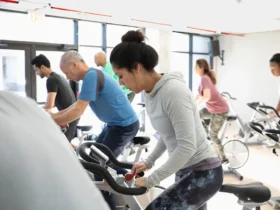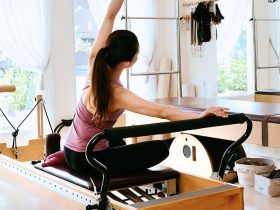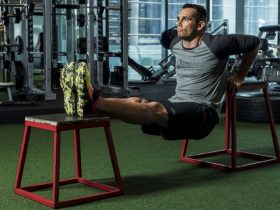The fitness world has evolved dramatically over the past decade, driven by technological advancements, changing attitudes toward health, and an increasing awareness of the importance of physical well-being. Among the various fitness trends, one aspect that continues to gain traction is beginner workouts. Whether you are just stepping into the gym or seeking to establish a sustainable fitness routine after years of inactivity, beginner workouts are designed to offer a solid foundation for long-term success. The future of these workouts, with their promise of real, measurable results, is exciting and filled with potential.
In this article, we will explore how beginner workouts are evolving and why they are poised to become a cornerstone in the fitness industry. From personalized fitness technology to holistic approaches that integrate physical and mental health, the future of beginner workouts is a dynamic mix of accessibility, effectiveness, and inclusivity.
The Shift Toward Personalization
In the past, beginner workouts often involved a one-size-fits-all approach—think generic, cookie-cutter routines that didn’t account for an individual’s unique fitness level, body type, or specific goals. As technology has advanced, however, we’re seeing a significant shift towards personalization in fitness. The future of beginner workouts will increasingly rely on tools like wearable technology, AI-driven fitness apps, and smart equipment to tailor routines to each individual’s needs.
Today, apps like MyFitnessPal, Fitbit, and Peloton are already utilizing data to help beginners track their progress. These tools can assess activity levels, suggest personalized workouts based on progress, and adjust intensity as needed. For example, a fitness app might analyze how well someone completes a particular exercise, assess their form, and recommend modifications or progressions. In the future, this will become even more sophisticated. Beginners will be able to receive real-time feedback, adjust their intensity, and even get motivation from virtual coaches—all aimed at ensuring they achieve real, sustainable results without pushing their bodies too hard too soon.
Furthermore, AI technology will enable virtual workouts to evolve beyond pre-recorded sessions, offering on-the-spot modifications and progressions to fit the user’s current capacity. This level of personalization will ensure that beginners stay challenged but not overwhelmed, enhancing long-term success.
Accessibility and Inclusivity in Fitness
Historically, the fitness industry has been criticized for creating an exclusive environment where only a certain body type, level of fitness, or socioeconomic status was celebrated. However, as the fitness world continues to evolve, a much-needed wave of inclusivity and accessibility is gaining momentum. This shift is particularly evident in the realm of beginner workouts, as more programs and platforms focus on catering to people from all walks of life.
The future of beginner workouts will see a stronger emphasis on inclusivity, with programs designed for a wide range of fitness levels, ages, body types, and mobility challenges. Fitness programs that include modified exercises for people with physical limitations, for example, are becoming increasingly common. Similarly, beginner workouts are likely to incorporate more flexibility in terms of location and time, allowing participants to engage in their routines from home or at the gym, at a time that suits their lifestyle.
This inclusivity also extends to mental health. More fitness programs are now recognizing the important connection between physical health and mental well-being. The future of beginner workouts will likely see a greater focus on holistic approaches that address not only the body but also the mind. Practices like mindfulness, yoga, and stress-relief techniques will be integrated into beginner routines, creating a more well-rounded approach to fitness.
Integration of Virtual and In-Person Training
As virtual fitness has surged in popularity, particularly during the COVID-19 pandemic, many beginners have become accustomed to following online workout programs. However, as the world returns to normal, there is a growing recognition that a hybrid model—combining both virtual and in-person training—might be the ideal way forward for beginner workouts.
The future of beginner fitness will likely be shaped by this combination of virtual and live experiences. Virtual coaching provides the convenience of working out from home, but it often lacks the personal connection and hands-on adjustments that in-person training can offer. By blending the best of both worlds, beginners will have the option to take part in live-streamed or on-demand classes while still receiving the benefits of personalized attention from trainers in a gym or studio setting.
For example, beginners might participate in a live virtual session that they can do in their own living room, but their form can be corrected in real-time via video analysis or through integration with smart equipment that provides detailed feedback. In addition to this, in-person experiences could be reserved for regular check-ins, goal assessments, and one-on-one consultations with personal trainers. This hybrid model allows for a greater sense of community and accountability, all while maintaining the flexibility that virtual workouts provide.
Progressive Learning and Micro-Goals
The future of beginner workouts will likely emphasize progressive learning, where individuals are encouraged to build their fitness skills gradually. Instead of focusing on the end result, such as losing weight or gaining muscle, beginner workouts will prioritize the process—making it a journey of personal improvement. This approach is more sustainable, motivating, and less likely to lead to burnout or injury.
By setting micro-goals—small, manageable milestones along the way—beginners will be able to track their progress and celebrate small wins. These micro-goals could include mastering a specific exercise, reaching a certain number of repetitions, or improving flexibility over a set period of time. Such a system allows beginners to stay engaged, while also allowing for flexibility in terms of pace.
Progressive learning in beginner workouts will also include adaptive exercises that evolve as the participant’s fitness level improves. These exercises will help individuals safely challenge themselves and break through plateaus, building confidence and momentum along the way.
The Role of Recovery in Beginner Fitness
While intense exercise has long been the focus of fitness routines, the future of beginner workouts will place an increased emphasis on recovery. As fitness science advances, experts have come to recognize that rest, recovery, and proper nutrition are just as important as the workouts themselves. The future will bring a more balanced approach, where beginners understand the importance of giving their bodies time to recover and heal.
The rise of recovery tools like foam rollers, compression garments, and massage guns is a clear indication that this focus on recovery is growing. Additionally, beginner workouts will incorporate more techniques for active recovery, such as stretching, yoga, and foam rolling, into daily routines. This ensures that beginners don’t overstrain their bodies while still reaping the benefits of consistent exercise.
The Final Word: Real Results Are Within Reach
The future of beginner workouts is not just about working harder but smarter. With advances in technology, a growing focus on inclusivity, and a holistic approach to health, beginner fitness is becoming more accessible and effective than ever before. Personalized workouts, hybrid fitness models, and an emphasis on progressive learning are all helping to create a fitness environment where real, lasting results are within reach for everyone—regardless of their starting point.
For those just beginning their fitness journey, the future holds great promise. With the right guidance, tools, and mindset, achieving sustainable progress will not only be possible—it will be expected. The key lies in staying consistent, being patient with yourself, and embracing the process of growth and improvement. The future of beginner workouts is here, and it’s designed to help you thrive.









